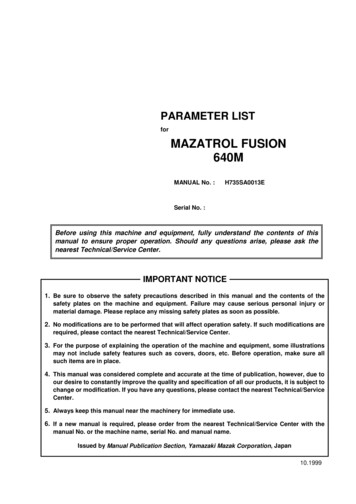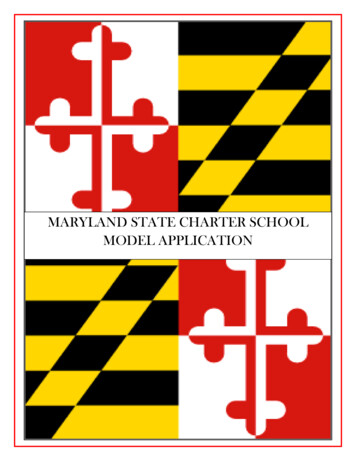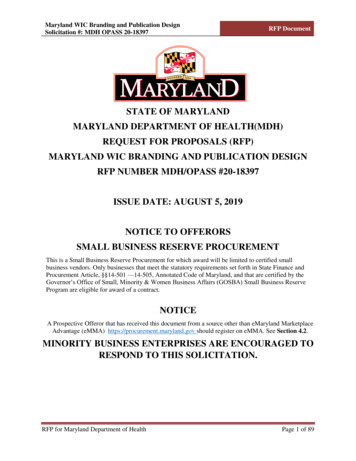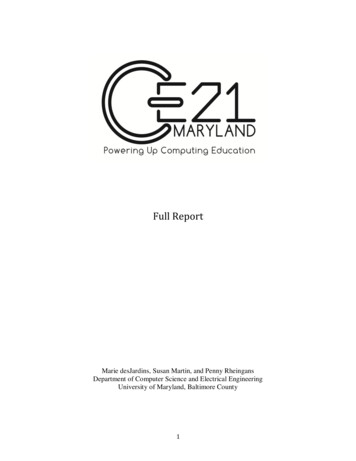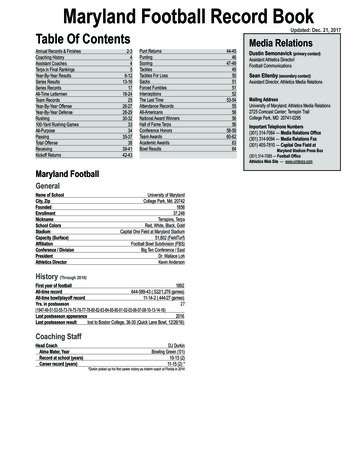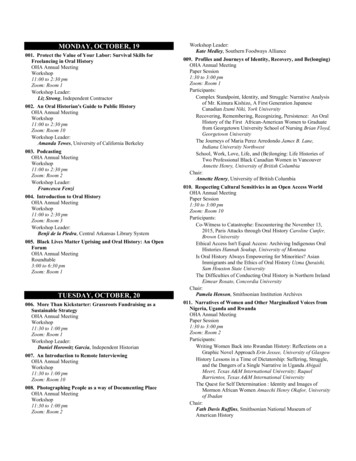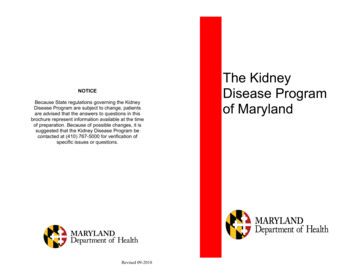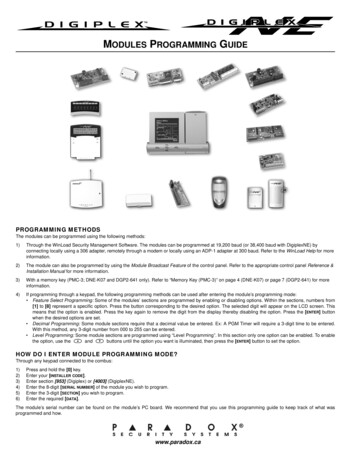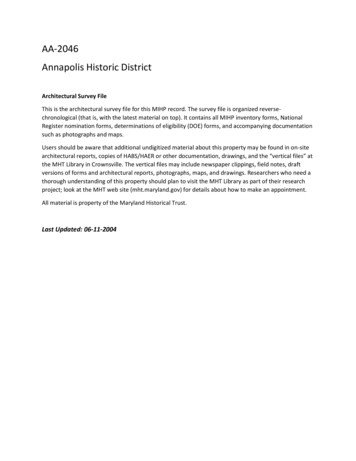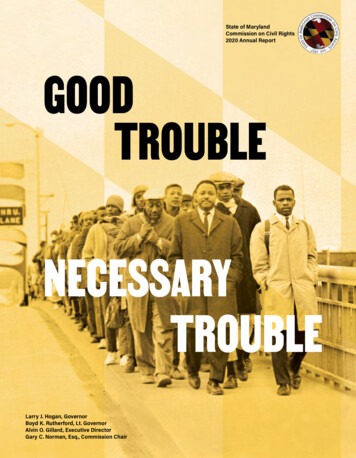
Transcription
State of Maryland Commission on Civil Rights2020 Annual ReportGOODTROUBLENECESSARYTROUBLELarry J. Hogan, GovernorBoyd K. Rutherford, Lt. GovernorAlvin O. Gillard, Executive DirectorGary C. Norman, Esq., Commission Chair
In July, the nation mourned theloss of Rep. John Lewis, a civilrights icon and leader of Congressfor three decades. Shown on thecover during the 1965 march to theAlabama state capital across theEdmund Pettus Bridge.
NEVER, EVER BE AFRAIDTO MAKE SOME NOISE ANDGET IN GOOD TROUBLE ,NECESSARY TROUBLE.REP. JOHN LEWIS (1940–2020)Image by Joe Yates via Unsplash
MCCR ANNUAL REPORT2STATE OF MARYLAND COMMISSION ON CIVIL RIGHTS“Our vision is to have a State that is free from any trace of unlawful discrimination.”The HonorableLarry HoganGovernor,State of MarylandState House,100 State CircleAnnapolis, MD 21401The HonorableBill FergusonPresident,Maryland State SenateState House H-107,100 State CircleAnnapolis, MD 21401The HonorableAdrienne A. JonesSpeaker, MarylandHouse of DelegatesState House H-101,100 State CircleAnnapolis, MD 21401January 1, 2021Governor Hogan, President Ferguson, and Speaker Jones:In accordance with §20-207(c) of the State Government Article, AnnotatedCode of Maryland, we hereby submit to you the Annual Report of the State ofMaryland Commission on Civil Rights (“MCCR”; “the Commission”) for FiscalYear 2020. We are pleased to report that the Commission continues to improveupon its services in order to enforce Maryland’s anti-discrimination laws whileadvancing and promoting civil rights in our State. The Commission is gratefulto Governor Hogan, the Department of Budget & Management, the MarylandState Senate, and the Maryland House of Delegates for their assistance andcontinued support of our mission.As you know, the State workforce was ordered to begin working from homein March, 2020, as a result of the COVID-19 pandemic. Fortunately, the Commission had taken steps over the previous years to implement an infrastructurethat enabled staff to complete their work remotely, while ensuring that we werecapable of connecting with and receiving complaints of alleged unlawful discrimination from throughout the State. Because of these proactive measures,the Commission was able to mitigate much of the impact on service deliveryonce remote work operations were initiated.Despite the challenges arising from the pandemic, MCCR enjoyed continued success through Fiscal Year 2020. The Commission fulfilled the obligationsof its federal contracts with both the U.S. Equal Employment OpportunityCommission (“EEOC”) and the U.S. Department of Housing & Urban Development (“HUD”). Our total case closure numbers were 620 EEOC closures, and125 HUD closures. The HUD closure number increased by 19 over last year,and is now the fourth year in a row that the agency has been able to increaseits closure rate. MCCR expects to continue building upon our overall four yearpositive trajectory in FY2021.
OFFICERSAlvin O. Gillard,Executive DirectorNicolette Young,Assistant DirectorGlendora C. Hughes,General CounselGovernorLarry HoganLt. GovernorBoyd K. RutherfordCommission ChairpersonGary C. Norman, Esq.Commission Vice ChairpersonRoberto N. Allen, Esq.COMMISSIONERSAllison U. Dichoso, Esq.Hayden B. DukeJanssen E. Evelyn, Esq.Eileen M. Levitt, SPHR, SHRM-SCPRabbi Binyamin MarwickJeff RosenGina McKnight-Smith, PharmD, MBAThroughout 2019 and 2020, we as a State and as a nation have seen a rise inactivism to address continued social challenges, including race based inequalitiesand the call for police reform. The senseless deaths of Ahmaud Arbery of Georgia,George Floyd of Minneapolis, and Breonna Taylor of Kentucky should shake us allto our cores regardless of our race, politics or faith. In the year 2020 in the UnitedStates of America, these types of acts should not be occurring, and certainly theyshould not be happening with apparent impunity. It should not take the uncoveringof videos or acts of civil unrest and uprisings for responsible offenders to be heldaccountable for their acts of hate, disregard, indifference and murder. Fortunately, the Maryland Commission on Civil Rights continues to foster meaningfulconnections with leaders and communities across the State actively working toreform our system so that we can achieve equity, inclusion, and opportunity for all.While there is so much work that remains to be done, MCCR is encouraged by thecommitment to justice for all that has been expressed by businesses, communities,and policy leaders.Overall, we are pleased to report that the Maryland Commission on Civil Rightsmaintains a strong commitment to the mission of the agency. Again, thank you foryour continued support, as well as your leadership and service to Maryland. TheState of Maryland Commission on Civil Rights appreciates the priority and commitment placed on the promotion and improvement of civil rights in our great State.Respectfully submitted,Gary C. Norman, Esq.COMMISSION CHAIRAlvin O. GillardEXECUTIVE DIRECTOR
A PIVOTAL MOMENT4APIVOTALMOMENTIn 2020, like all other agencies in our state, the MarylandCommission on Civil Rights (MCCR) responded to multipleunprecedented challenges while continuing our work tostamp out all traces of unlawful discrimination in our state.
When the COVID-19 pandemic forced all state agencies to shift toremote operations in March 2020, we transitioned without a hitchthanks to proactive planning and infrastructure investments ofthe past few years. Unfortunately, the public health emergencydid force us to postpone until 2022 our biennial civil rights and fairhousing gala, celebrating a century of women’s right to vote and 30years of the Americans with Disabilities Act.Our Education & Outreach Unit movedto virtual training platforms and developed new digital training modulesfor state employees and businesses.As COVID-19 shut down businessesand thrust many Marylanders intoeconomic hardship, we responded toCOVID-19-related complaints, whileseeing a reduced number of publicaccommodation complaints as peopleheeded the call to stay at home.At the same time, the highly publicized killings of Ahmaud Arbery inGeorgia, George Floyd in Minneapolisand Breonna Taylor in Kentucky, andthe nationwide calls for reforms toaddress systemic racism in our countryshone a new light on the importanceof the work MCCR has been doing fornearly a century to promote equity,inclusion and opportunity for all in theState of Maryland. We saw new trendsemerging in the types of discriminationprevalent in the state. In just one significant example, the Office of the GeneralCounsel pursued charges in a caseof discrimination by a wedding venueagainst a same-sex couple seeking tomarry there, a first in Maryland.2244Operating BudgetTABLE OF CONTENTS6Program Overview & TimelineGeneral Counsel25 2020 Significant Litigation1228Education & Outreach15 How to File a Case with MCCR16 Employment Discrimination Cases18 Housing Discrimination Cases20 Public AccommodationDiscrimination Cases32 Education & Training34 Outreach & CollaborationCase Processing45Board of Commissioners2020 Activities46Organizational Chart
PROGRAM OVERVIEW & TIMELINE6OURFOCUS
The Maryland Commission on Civil Rights (MCCR) is an independentstate agency serving individuals, businesses and communitiesthroughout Maryland. MCCR is governed by a nine-memberCommission appointed by the Governor and confirmed by theMaryland State Senate to serve six-year terms. The Commissionmeets once a month to set policy and review programmaticinitiatives.MCCR’s mandate is to ensure equal opportunity throughenforcement of Title 20 of the State Government Article and Title 19of the State Finance & Procurement Article (the state’s CommercialNon-Discrimination Policy), Annotated Code of Maryland.Since 1968, the Commission has had authority to administerand enforce the Maryland Public Accommodations Law, theDiscrimination in Housing Law and the Fair Employment PracticesLaw. To achieve this, MCCR has a deferral relationship and fundingprovided by the Equal Employment Opportunity Commission andthe U. S. Department of Housing & Urban Development.OUR MISSIONis to ensure opportunity for all through theenforcement of Maryland’s laws against discriminationin employment, housing, public accommodations,and state contracts; to provide educational outreachservices related to provisions of this law; and topromote and improve civil rights in Maryland.OUR VISIONis to have a state that is free fromany trace of unlawful discrimination.
PROGRAM OVERVIEW & TIMELINE8LEADING THE CHARGE F OREQUITY IN MARYLAND F ORNEARLY 100 YEARSMARYLANDCOMMISSION ONCIVIL RIGHTSMaryland General Assemblycreates the InterracialCommission of Maryland(Chapter 559 of 1927),consisting of 9 Black membersand 9 White members –without investigative orenforcement powers.1927NEARLY ACENTURY OFPROGRESSCommission advocates againstthe Act of 1904, Maryland’s“Jim Crow” Law, which requiredseparate seating, dining andsleeping arrangements forBlacks and Whites on railroadsand steamship lines operatingin Maryland.Renamed the Commissionto Study ProblemsAffecting the ColoredPopulation (Chapter 432of 1943) – without staff orfunding to proactively andactively affect public policy.19421943Racial tensions eruptin riots in Baltimore.Commission recommendsaddressing disparitiesin education, includingestablishing an institutionof higher learning for“Colored people aroundMorgan College.”
MCCR’S ACTIVITIESInvestigate complaints of unlawful discrimination in employment, housing,public accommodations and state contracts based on employment, housing,public accommodations, or state contracts because of race, color, religion orcreed, sex, age, ancestry or national origin, marital status, physical or mentaldisability, sexual orientation, gender identity, genetic information (employmentonly), familial status (housing only), and/or s ource of income (housing only).Promote awareness and understanding of Maryland’s anti-discrimination laws.Help to promote and improve civil rights within the state by working withemployers to develop bias-free selection, hiring, retention, promotion andcontracting procedures; advocating equal housing opportunities for all groups;and working to advance equal access to public accommodations and services.Rebranded theCommission onInterracial Problemsand Relations(Chapter 548 of 1951).1946The MarylandCongress AgainstDiscriminationmeets.19511963More than 200,000 demonstratorsMarch on Washington for Jobsand Freedom.Protests lead to desegregation ofGwynn Oak Amusement Park inBaltimore County.Race riots erupt in Cambridge, Md.1964Civil Rights Act of 1964prohibits discriminationbased on race, color,religion, sex, nationalorigin (and later sexualorientation and genderidentity).
PROGRAM OVERVIEW & TIMELINE10Established as theCommission on HumanRelations (Chapter 83of 1968), and for the firsttime allotted a budget forpaid staff.1965 1967 1968Maryland passes the FairEmployment Act.U.S. passes the VotingRights Act of 1965.Maryland repealsban on interracialmarriage.Protections againstdiscrimination onthe basis of sexualorientation codifiedwith Chapter 340of 2001.1969Following the assassinationof Dr. Martin Luther King,Jr., riots erupt in Baltimorein April.President Lyndon B. Johnsonsigns the landmark FairHousing Act (Civil RightsAct of 1968).Name changed to the Maryland Commissionon Civil Rights to reflect the anti-discriminationwork through enforcement of the state’s antidiscrimination laws, as well as through publicoutreach and education (Chapter 580 of 2011).2001Empowered to initiateand investigatecomplaints ofdiscrimination againststate agencies (Chapter153 of 1969).Vested with the authorityto enforce Maryland’santi-discriminationlaws in employment,housing and publicaccommodation on thebasis of gender identity.2011 2013 2014Pregnant employeesgain the legal right torequest a reasonableaccommodation atwork (Chapters 547and 548 of 2013).Maryland passes theFairness to All MarylandersAct of 2014 (Chapter 474 of2014), codifying more thana decade of actions thatestablished gender identityas a protected class.
Permitted for the firsttime to seek certaintypes of court reliefin order to preservethe status of parties orprevent irreparable harm.19741975 1977 1999Maryland laws amended to ban:housing discrimination based onmarital status and sex;certain employment practices andhousing discrimination againstpeople with mental or physicaldisabilities;discriminatory practices in publicaccommodations, employmentand housing due to marital statusor physical or mental handicap.Gains increasedindependence andautonomy in operationsand is empoweredto award monetaryrelief to the victimsof employmentdiscrimination.Chapter 333 of 1975 makesit lawful for employersto set standards foremployee dress andgrooming that relatedirectly to the nature ofthe employmentChapter 907 of 1977requires employers to treatdisabilities related topregnancy or childbirthin the same manner asother disabilities.Governor Parris N.Glendenning is thefirst sitting governor toadvocate for banningdiscrimination onthe basis of sexualorientation.Launches the WesternMaryland Advisory Council(WMAC) to serve Allegany,Frederick, Garrett andWashington counties.2015Interns are protectedfrom discrimination andharassment at their place ofinternship (Chapter 43 of 2015).20182020The Housing Opportunities Made Equal Actadds “source of income” as a protected classunder Maryland’s Fair Housing law (Chapters116 and 117 of 2020).The Crown Act passes (Chapters 473 and474 of 2020), identifying discrimination basedon an applicant’s or employee’s hair texture,style or protective hairstyle as a type of racediscrimination under existing Maryland EEO law.
CASE PROCESSING DEPARTMENT12CASEPROCESSINGDEPARTMENT
MCCR’s Case Processing Department investigates complaints inthe areas of employment, housing, public accommodations andstate contracts. Our mandate is to protect against discrimination inemployment, housing, public accommodations or state contractsbecause of race, color, religion or creed, sex, age, ancestry ornational origin, marital status, physical or mental disability, sexualorientation, gender identity, genetic information (employmentonly), familial status (housing only) and/or source of income(housing only).MCCR receives complaints directlyfrom individuals who believe they havebeen victims of unlawful discrimination and collaborates with the EqualEmployment Opportunity Commission(EEOC) and the U.S. Department ofHousing & Urban Development (HUD).
CASE PROCESSING DEPARTMENT14SERVING ALL OF MARYLAND FY2020 Cases: Intakes by RegionCentral533 cases (84%) Western38 cases (6%) Eastern ShoreSouthern41 cases (8%)18 cases (2%)Type of Closure732 886147 (20%)01 (.1%)61 (8%)332 (46%)191 (26%)FY2019Withdrawn with BenefitsUnsuccessful ConciliationSuccessful ConciliationSettlementsNo Probable CauseAdministrative ClosureMonetary Relief 899,014 1,420,559FY2020 TOTAL CASE CLOSURESFY2020 FY2019
FY2020 CHALLENGES5vacant positionsin FY2020269COVID-19 related inquiriesreceived February throughJune 2020resulted inchargesComplaints by Area of DiscriminationEmployment 609 (79%)HOW TO FILE A CASEAnyone who wishes to file acomplaint with MCCR allegingunlawful discrimination inviolation of Title 20 of theState Government Article orTitle 19 of the State Finance &Procurement Article should:Complete an online inquiry formon the MCCR website. Thoseneeding assistance can contactMCCR by telephone, e-mail, faxor mail to begin theprocess offiling a complaint.File the complaint within 6months of an alleged unlawfulincident of employmentor public accommodationdiscrimination.File the complaint withinone (1) year of an allegedunlawful incident of housingdiscrimination.Housing 128 (7%)Public Accommodation 33 (4%)State Contracts 0Learn more or file a complaintonline at mccr.maryland.gov/Pages/Intake.aspx
CASE PROCESSING DEPARTMENT16CASE PROCESSING DEPARTMENTEMPLOYMENTEvery year, employment discrimination complaints account for approximately80% of MCCR’s total intake. In 2020, we saw a continuation of a concerning trend:the rise in retaliation complaints. Fear of retaliation has a chilling effect on effortsto encourage reporting of employment discrimination. Since 2017, retaliation hasbeen the #1 employment-related complaint received by MCCR. The drop in totalnumber of retaliation cases from FY2019 to FY2020 mirrors both the simultaneousnational rise in these cases and the leveling-off of complaints we’ve receivedover the past few years. FY2016 and FY2017 saw massive spikes in intakes, andnumbers have steadily declined to more typical levels this year. Harassmentwas #2 in frequency of complaints in 2020. For the first time in 2020 disabilityreplaced race as the #1 protected class among individuals filing discriminationcomplaints with MCCR, followed by race.CASES TRANSFERREDRETALIATION COMPLAINTS182016to EEOC102from EEOC2017185306201820192020356336309
Breakdown of Employment Complaints, 20 122RELIGION233SEX1338111 55AGE5MARITAL HER0GENDER IDENTITYGENETIC INFORMATIONSEXUAL ORIENTATIONCOLORCOMPLAINTS BY RACEBlack – 132 (84%)White – 18 (11%)Asian 4 (3%)American Indian/Alaskan Native – 3 (2%)COMPLAINTSBY SEXFemale 86 (70%)Male 36 (30%)COMPLAINTS BYRELIGIONOther 11 (55%)Catholic 2 (10%)Jewish 3 (15%)Muslim 4 (20%)COMPLAINTS BYNATIONAL ORIGINOther 34 (62%)Hispanic 17 (31%)East Indian 2 (3%)Mexican 1 (2%)Arab, Afghani,Mid-Eastern 1 (2%)Case Studies: Employment DiscriminationBased on DisabilityAnne Arundel CountyAssigned to work in her employer’swarehouse, the complainant inquiredabout how to request a reasonableaccommodation based on her disability. After she provided the medicaldocumentation requested by heremployer to support her request, thecomplainant was told not to return tothe worksite. MCCR was able to negotiate a settlement for back wages.Based on Race, National Originand DisabilityBaltimore CountyThe complainant alleged that her employer had terminated her based on herrace, national origin and disability. Shealleged that she had been subjectedto a hostile work environment and harassment, and that when she requesteda reasonable accommodation for herdisability, she was discharged. TheMCCR investigator facilitated a privateagreement that included payment of 20,000, and the complainant withdrewthe underlying charge of discrimination.RetaliationBaltimore CityAn employee of a healthcare facilityalleged that her employer retaliatedagainst her after she filed a complaintof discrimination based on race andsex with MCCR. Her employer deniedall allegations, saying they had initiatedan investigation into the complainant’sperformance simply to ensure a nontoxic workplace environment free of intimidation for all employees. Followinga lengthy and thorough investigation,the parties finally reached a point ofconciliation, and ultimately settled thematter for 7,500.
CASE PROCESSING DEPARTMENT18CASE PROCESSING DEPARTMENTHOUSINGIn recent years, MCCR has been concerned that its typical annual caseload ofapproximately 100 housing discrimination cases is an inappropriately low levelof reporting based on the state’s population of 6 million residents. Throughtargeted outreach, we have actively worked to educate the public about theirrights and about MCCR’s role in investigating housing discrimination complaints.Understanding the pain and suffering experienced by the victims of housingdiscrimination, MCCR seeks to investigate and issue a written finding within 100days of receipt of complaints in this area. In FY2020, we saw a significant uptickin total cases: from 93 in FY2019 to 128 for FY2020. Consistent with historic trends,disability complaints related to accessibility remained the #1 type of complaintthis year, followed by race.
Breakdown of Housing Complaints, NTSBY SEXFemale 8 (89%)Male 1 (11%)0COMPLAINTS BYRELIGIONMuslim 100%GENDER IDENTITYSEXUAL HARASSMENTMARITALSTATUSCOMPLAINTS BY RACEBlack – 48 (91%)White – 3 (5%)American Indian/Alaskan Native – 2 (4%)COMPLAINTS BYNATIONAL ORIGINHispanic 3 (20%)Other 12 (80%)Case Studies: Housing DiscriminationBased on DisabilityPrince George’s CountyBased on SexKent CountyBased on Race and DisabilityAnne Arundel CountyA college student sharing commonareas with three dormitory roommatesfiled a housing charge on the basis ofher disability, requesting reasonableaccommodation for her cat, an emotional support animal (ESA). During theconciliation process, the student andresidence staff agreed that she couldbring her ESA into the residence if herroommates agreed. If they didn’t agree,she could move to a residence unitwhere her ESA could accompany her.With the approval of her roommates,the student was able to move her emotional support cat into the dorm.Complainants alleged they were sexually harassed by their landlord. MCCR’sinvestigation produced evidence ofsexually explicit requests from thelandlord via text, and threats to damagethe property and to evict the tenants ifthey did not comply with his demands.When the tenants refused the landlord’srequests, they were evicted from theproperty. A probable cause finding wasissued, and MCCR has begun conciliation efforts with the parties.A disabled resident asked for adesignated parking space becausea neighbor’s multiple vehicles werefilling all the spaces closest to her unit.The homeowners’ association (HOA)agreed to create a handicap space,but not for her sole use. The neighbor,a HOA board member, supervised thepainting of the handicap space with aderogatory, demeaning and discriminatory symbol, subjecting her to ridicule.She filed a retaliation complaint withMCCR, and we negotiated a settlementfor an apology, a designated parkingspace marked with a generic handicapsymbol and 15,000 in damages.
CASE PROCESSING DEPARTMENT20CASE PROCESSING DEPARTMENTPUBLICACCOMMODATIONComplaints of discrimination against an owner or operator of a place of publicaccommodation fell in 2020 as a percentage of MCCR’s total caseload. The lowrate of reporting reflects reduced traffic to retail establishments, restaurantsand other commercial businesses during COVID-19 lockdowns beginning in March.Consistent with history, disability remained the #1 reported protected class forpublic accommodation complaints in 2020. National origin complaints, specificallyagainst Hispanic complainants, skyrocketed in 2020 to the #2 protected class,which may reflect an increasingly hostile climate towards Hispanic populationsfueled by anti-immigration rhetoric nationally. Complaints based on race at #3were slightly down from FY2019.
Breakdown of Public Accommodation Complaints, SEXUALORIENTATION3OTHER130SEXMARITAL STATUSHARASSMENTGENDER IDENTITYAGECOMPLAINTS BY RACEBlack – 11 (92%)American Indian/Alaskan Native – 1 (8%)COMPLAINTS BYRELIGIONJewish – 1Other - 8COMPLAINTS BYNATIONAL ORIGINHispanic 13 (100%)COLORRETALIATIONCase Studies: Public Accommodation DiscriminationBased on Race and SexBaltimore CityBased on DisabilityHarford CountyBased on Race and National OriginHoward CountyThe complainant was an African American man shopping at a retail store withhis children. After he made a purchase,the complainant was accused ofstealing. Police were called, but thestore’s security tape did not show thealleged theft, and he was not detained.Public accommodation complaints arenot normally settled with monetarypayments, but in this case, the partiesagreed to a monetary settlementduring the conciliation process.A resident filed a complaint againsther homeowner’s association (HOA)because their meeting locations werenot accessible to her. She had a disability that interfered with her mobilityand made her unable to use stairs, andon two occasions HOA meetings wereheld at a location without an elevator,preventing her from attending. MCCRfacilitated a process that resulted in theHOA agreeing not to hold meetings atthat location until a new elevator couldbe installed.In a 2019 case resolved in 2020, thecomplainant was not allowed to purchase a promotional gift card from astore because the cashier assumed shewas a member of the same household as a man who already gottena card—because the two customershad entered the store at the sametime and were both Asian-American.The complainant explained that shedid not know the man, but the cashierrefused to sell her the gift card. In hercomplaint, the woman told MCCR shewanted an apology letter from thestore, which she received.
OFFICE OF THE GENERAL COUNSEL22OFFICEOF THEGENERALCOUNSEL
The MCCR’s Office of the General Counsel (OGC) is an independentlegal department serving as the Commission’s chief legal counsel.The OGC represents MCCR in litigation and negotiations and provideslegal advice to the agency’s commissioners, management and staff.In addition, the OGC manages MCCR’s legislation and regulationactivities—drafting bills and regulations, testifying and providingtechnical assistance to legislators.Because the OGC operatesindependently from the Office of theAttorney General, which representsmost state agencies, OGC is able topursue legal action in discriminationcharges the Commission might bringagainst the State of Maryland underthe state’s anti-discrimination statute,Title 20 of the State Government Article.The OGC represents MCCR onthe state’s Equal Pay Commissionand the Office of the AttorneyGeneral’s Hate Crimes Workgroup.The Assistant General Counselparticipates in the MarylandVolunteer Lawyers Service andthe Pro Bono Resource Center.
OFFICE OF THE GENERAL COUNSEL24OFFICE OF THE GENERAL COUNSELThe OGC does extensive outreach to the general public, stateand local governments, and to a wide range of agencies andorganizations, including bar associations and the Office of theAttorney General, among others. The focus of these activities ison providing technical assistance on anti-discrimination law andcivil rights challenges.2020 OGC Outreach HighlightsGuest speaker or presenter:Maryland Non-Profits Equity SpeakerSeries; Legal Aid workshop on barriers to employment discrimination;Law Firm of Franklin & Prokopik’sLabor & Employment Law Seminar;the EEOC’s Regional EmploymentSeminar Conference; University ofMaryland Francis King Carey Schoolof Law symposium panel on “Challenging Gender Bias in the LegalProfession.”Bar association activities: serve onthe Maryland State Bar Association’s(MSBA) Labor & Employment Section Council and MSBA’s Diversity &Inclusion Committee; moderated aseminar on “Medical Cannabis in theWorkplace” at the Legal Summit &Annual Meeting, and a MSBA webinar on “Labor and Employment Lawduring COVID-19.”Trainings & Workshops: sexualharassment prevention and Train theTrainer workshops to state agencies;workshops on “Employment Law 101”at the statewide EEO Coordinator’sOffice’s annual retreat; “InvestigativeTechniques and Theories” workshopfor state agencies’ EEO coordinators; E&O “Disability & ReasonableAccommodation Seminar” for PrinceGeorge’s County Government; seminar on “Faith & Religion Accommodation in the Workplace” in partnership with the Jewish CommunityService, Baltimore Jewish Council &Center for Leadership, a program of“the Associated.”
2020 SIGNIFICANT LITIGATIONAN EVENT VENUE REFUSES TOHOST A SAME-SEX WEDDINGA same-sex couple planning to marrycontacted a wedding and receptionvenue in Elkton after seeing an ad onweddingwire.com. They called and thefacility’s owner invited them to visit thatsame day, so they drove 90 minutesfrom Laurel to tour the facility. Theywere greeted by the owner, but weretold that, as a same-sex couple, theycould not be married there even thoughsame-sex marriage is legal in Maryland.MCCR and the complainant attempted to negotiate a resolution during theinvestigation and after the ProbableCause finding was issued, but theowner of the facility refused to cometo a meaningful resolution, asserting afirst amendment right (freedom of religion) to deny service based on sexualorientation.Similar defenses that have beenmade ever since the Civil Rights Movement (for example, to deny service toBlack and African American individuals) have not held up when legallychallenged. Maryland law prohibitsbusinesses that serve the public fromdiscriminating against customers, andthe first amendment does not conveyon business owners/operators a rightto discriminate against members of aprotected class in state law.Unable to negotiate a resolution, theOGC filed a Statement of Charges withthe Office of Administrative Hearingscontending that the facility refusedto allow the wedding of a same-sexcouple on its grounds, while heterosexual couples were welcome to marrythere—charging the place of publicaccommodation with discriminationbased on sexual orientation.This Cecil County wedding and event venue violated statelaw in refusing to host the wedding of a same-sex couple,interfering with the complainant’s state-protected right not tobe subjected to unlawful discrimination by a place of publicaccommodation at its facility. Maryland’s anti-discriminationstatute, Title 20 of the State Government Article, prohibits theowner of a place of public accommodation to refuse, withhold,or deny any person any of the accommodations, services,goods, advantages, facilities or privileges of the facilitybecause of sexual orientation, race, sex, age, color, creed,national origin, marital status, gender identity or disability.
“I WISH FOR AWORLD THAT VIEWSDISABILITY.NOTAS A HINDRANCEBUT AS UNIQUEATTRIBUTES THATCAN BE SEEN ASPOWERFUL AS
Maryland State Senate State House H-107, 100 State Circle Annapolis, MD 21401 The Honorable Adrienne A. Jones Speaker, Maryland House of Delegates State House H-101, 100 State Circle Annapolis, MD 21401 STATE OF MARYLAND COMMISSION ON CIVIL RIGHTS "Our vision is to have a State that is free from any trace of unlawful discrimination."
